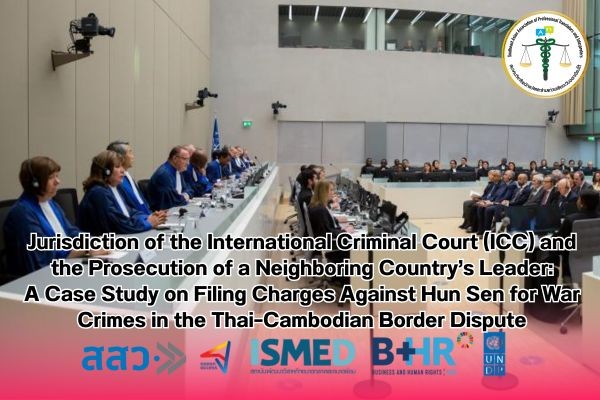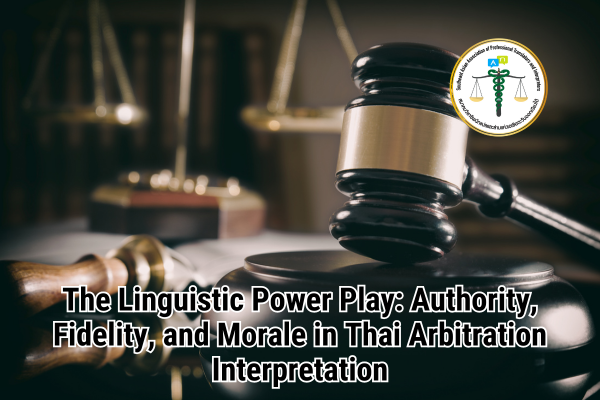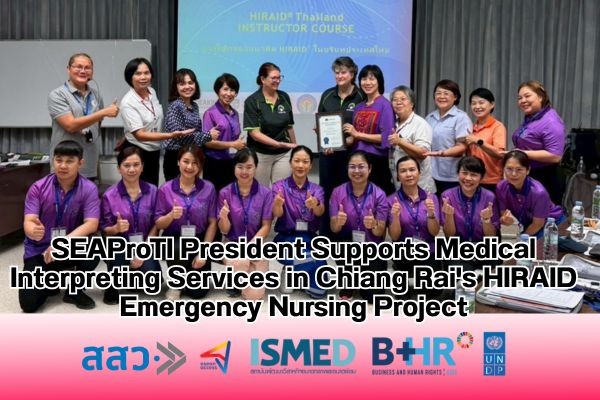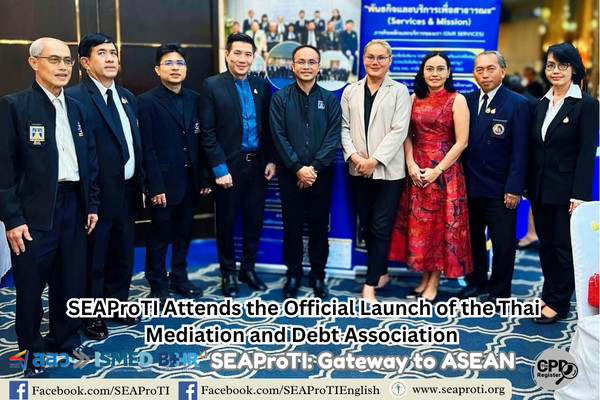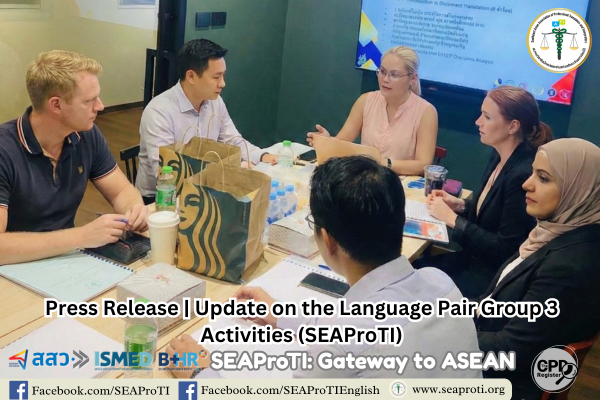Jurisdiction of the International Criminal Court (ICC) and the Prosecution of a Neighboring Country’s Leader:
A Case Study on Filing Charges Against Hun Sen for War Crimes in the Thai–Cambodian Border Dispute
Author: Wanitcha Sumanas, President of the Southeast Asian Association of Professional Translators and Interpreters (SEAProTI)
11 August 2025, Bangkok – This article examines the legal feasibility and political implications of Thailand potentially referring charges against Cambodian Prime Minister Hun Sen to the International Criminal Court (ICC) for alleged war crimes stemming from the 2025 border conflict. The conflict involved attacks on civilian areas within Thai territory. The discussion covers the ICC’s jurisdiction under the Rome Statute, admissibility criteria, evidentiary challenges, as well as diplomatic and geopolitical consequences for bilateral and regional relations.
Introduction
The Thai–Cambodian border conflict has a long history, involving disputed areas of historical and cultural significance, such as the Preah Vihear Temple and the Ta Moan Thom Temple (Dupuy & Dupuy, 2009). The violent incidents beginning on 24 July 2025—including artillery fire and attacks on houses, hospitals, and civilian areas—resulted in numerous deaths and injuries, sparking debates over violations of international humanitarian law (Henckaerts & Doswald-Beck, 2005).
ICC Jurisdiction and Territorial Limitations
Under the Rome Statute, the ICC has jurisdiction over war crimes, crimes against humanity, genocide, and the crime of aggression (Rome Statute, 1998, arts. 5–8). Jurisdiction is established when:
- The crime occurs in the territory of a State Party; or
- The perpetrator is a national of a State Party; or
- The United Nations Security Council refers the case, or
- A non-State Party accepts jurisdiction on an ad hoc basis (Schabas, 2017).
Cambodia has been a State Party since 2002. Therefore, if it can be proven that Cambodian forces committed war crimes—whether in Cambodian territory or elsewhere—the ICC could exercise jurisdiction. However, if the acts occurred solely within Thai territory, Thailand would have to accept ICC jurisdiction or have the matter referred by the UN Security Council, both of which involve complex political considerations.
Standards for Prosecuting a Head of Government
Holding the position of head of government does not exempt one from prosecution (Rome Statute, 1998, art. 27). Liability must be established under the doctrine of command responsibility, which requires proof that the leader:
- Had effective control over the forces;
- Knew or should have known about the unlawful acts; and
- Failed to take adequate measures to prevent or punish the perpetrators (McCormack, 2019).
The evidentiary standard is high, requiring credible and direct proof linking the leader’s orders and actions to the deliberate targeting of civilians.
Procedural Feasibility
If Thailand were to file a complaint with the ICC, the first step would be a preliminary examination to assess jurisdiction, admissibility, and the interests of justice. If this stage is successful, the matter would proceed to a formal investigation, which could take years. The main obstacle would be the enforcement of an arrest warrant, as Cambodia is unlikely to cooperate in surrendering its leader.
Political and Diplomatic Implications
- Cambodia’s Reaction: Phnom Penh could denounce the move as a politically motivated attack and use it to rally domestic support.
- ASEAN Dynamics: Prosecuting a sitting ASEAN leader before an international tribunal could strain the bloc’s consensus principle and push Cambodia closer to China.
- International Image: Thailand might gain support from certain states if evidence is compelling, but risks being perceived as using the ICC as a political tool.
Conclusion
While the prosecution of Hun Sen before the ICC is legally possible under international law, jurisdictional constraints, high evidentiary standards, and challenges in enforcement make the practical likelihood of success low. Nevertheless, such a move would carry significant diplomatic weight and could serve as a form of international pressure rather than a realistic means of securing punishment.
References
- Dupuy, P. M., & Dupuy, F. (2009). A legal analysis of the Cambodian–Thai territorial dispute concerning the Temple of Preah Vihear. Chinese Journal of International Law, 8(1), 77–96. https://doi.org/10.1093/chinesejil/jmp005
- Henckaerts, J.-M., & Doswald-Beck, L. (2005). Customary international humanitarian law: Volume I – Rules. Cambridge University Press.
- McCormack, T. (2019). International criminal law and the Asia–Pacific region. In S. Ford & S. Burchill (Eds.), The Asia–Pacific and the International Criminal Court (pp. 15–34). Cambridge University Press.
- Rome Statute of the International Criminal Court, July 17, 1998, 2187 U.N.T.S. 90.
- Schabas, W. A. (2017). An introduction to the International Criminal Court (5th ed.). Cambridge University Press.
Appendix:
Comparative Table on Legal Feasibility – Political Costs – Diplomatic Outcomes of Filing an ICC Case Against Hun Sen
Qualitative Rating Scale: Low (●), Medium (●●), High (●●●)
Shared Assumptions: Based on the Rome Statute framework, principles of international humanitarian law, ASEAN context, and recent ICC practice
| Scenarios / Options | Legal Feasibility | Political Costs (Domestic / International) | Diplomatic Outcomes (Bilateral / Regional / Multilateral) | Key Risks / Remarks |
|---|---|---|---|---|
| 1) Thailand submits information to the ICC Prosecutor based on the “Cambodian nationality” of the accused and/or conduct linked to Cambodian territory | ●● (Feasible if some conduct/effects can be linked to Cambodian territory, or if the perpetrator is a Cambodian national) | ●● (Domestic politics likely supportive, but risk of diplomatic friction) | ●● (Increases symbolic pressure; ASEAN discomfort; Western allies watch closely) | Requires evidence linking “orders – effective control – knowledge/should have known” (command responsibility) |
| 2) Thailand accepts ICC jurisdiction on an ad hoc basis (Art. 12(3)) for incidents on Thai territory | ●●● (Stronger because jurisdiction extends over acts in Thailand) | ●●● (High political cost: criticism over sovereignty and possible double standards domestically) | ●● (Improves transparency image, but risks strain in bilateral relations with Cambodia) | Thailand must accept potential implications for its own officials (principle of complementarity) |
| 3) Push for UNSC referral to the ICC (Art. 13(b)) | ●●● (Legally strong if successful) | ●●● (Very high: requires lobbying P5; risk of great power politics) | ●●● (Major ripple effect in the region; may be seen as “over-internationalizing” the dispute) | Politically unlikely if “veto” occurs |
| 4) Parallel approach: ICJ (territorial/State obligations) + ICC (individual criminal responsibility) | ●● (Parallel approach helps structure the factual framework) | ●● (Moderately acceptable domestically and with partners) | ●●● (Opens path for “package deals” diplomatically; ASEAN and mediators can play a role) | ICJ addresses State-to-State issues; ICC focuses on individual responsibility—separates arenas of dispute |
| 5) Halt ICC push, use bilateral/ASEAN/external fact-finding mechanisms instead | ● (Not ICC-based) | ● (Low cost) | ●● (Reduces tension, increases space for ceasefire/fact verification) | Suitable when “evidence not yet mature” or for urgent de-escalation |
| 6) Thailand aims for a direct ICC arrest warrant against the leader | ●● (Legally possible but requires investigation and authorization) | ●●● (Very high both domestically and regionally) | ●● (Enforcement limitations—depends on State Parties arresting during travel) | High symbolic impact, but enforcement is difficult (cf. al-Bashir case) |
| 7) Thailand submits only strong evidence of “deliberate attacks on civilians” (IHL / core conduct) | ●● (Depends on quality of field/OSINT/forensic evidence) | ●● (Less criticism than directly naming the leader) | ●● (Encourages independent investigative mechanisms/mediators to get involved) | Must prove war crimes elements (intent, targeting, proportionality, precautions) |
| 8) Pressure-building approach: seek “admission/apology/reparation” while preserving evidence for future ICC case | ●● (Lays groundwork for future case) | ● (Lower cost; broadens domestic consensus) | ●●● (Supports ceasefire agreements / preventive measures) | Uses ICC as a “shadow” bargaining tool rather than immediate litigation |
References:
- Dupuy, P. M., & Dupuy, F. (2009). Chinese Journal of International Law, 8(1), 77–96.
- Henckaerts, J.-M., & Doswald-Beck, L. (2005). Customary International Humanitarian Law: Vol. I – Rules. CUP.
- Rome Statute of the International Criminal Court, 1998.
- Schabas, W. A. (2017). An Introduction to the International Criminal Court (5th ed.). CUP.
- McCormack, T. (2019). In Ford & Burchill (Eds.), The Asia–Pacific and the ICC. CUP.
About SEAProTI Certified Translators, Certification Providers, and Interpreters
The Southeast Asian Association of Professional Translators and Interpreters (SEAProTI) has published official guidelines and eligibility criteria for individuals seeking registration as Certified Translators, Translation Certification Providers, and Certified Interpreters under Chapter 9 and Chapter 10 of the Royal Thai Government Gazette, issued by the Secretariat of the Cabinet, Office of the Prime Minister, on 25 July 2024 (Vol. 141, Part 66 Ng, p. 100). Full text available at: The Royal Thai Government Gazette
อำนาจศาลอาญาระหว่างประเทศ (ICC) กับการฟ้องร้องผู้นำประเทศเพื่อนบ้าน:
กรณีศึกษาการยื่นฟ้องสมเด็จฮุน เซน ในข้อหาก่ออาชญากรรมสงครามระหว่างข้อพิพาทชายแดนไทย–กัมพูชา
ผู้เขียน วณิชชา สุมานัส นายกสมาคมวิชาชีพนักแปลและล่ามแห่งเอเชียตะวันออกเฉียงใต้ (SEAProTI)
11 สิงหาคม 2568, กรุงเทพมหานคร – บทความนี้วิเคราะห์ความเป็นไปได้เชิงกฎหมายและผลกระทบทางการเมืองของการที่ประเทศไทยอาจยื่นฟ้องสมเด็จฮุน เซน นายกรัฐมนตรีกัมพูชา ต่อศาลอาญาระหว่างประเทศ (International Criminal Court – ICC) ในข้อหาก่ออาชญากรสงคราม อันเนื่องมาจากเหตุการณ์ความรุนแรงชายแดนในปี พ.ศ. 2568 ซึ่งมีการโจมตีพื้นที่พลเรือนในฝั่งไทย เนื้อหาครอบคลุมการพิจารณาอำนาจศาลของ ICC ภายใต้ธรรมนูญกรุงโรม (Rome Statute) เกณฑ์การรับฟ้อง ความท้าทายด้านพยานหลักฐาน ตลอดจนผลทางการทูตและภูมิรัฐศาสตร์ต่อความสัมพันธ์ทวิภาคีและภูมิภาค
บทนำ
ความขัดแย้งชายแดนไทย–กัมพูชามีประวัติยาวนาน ครอบคลุมพื้นที่พิพาทที่มีคุณค่าทางประวัติศาสตร์และวัฒนธรรม เช่น บริเวณปราสาทพระวิหารและปราสาทตาเมือนธม (Dupuy & Dupuy, 2009) เหตุการณ์ความรุนแรงที่เกิดขึ้นตั้งแต่วันที่ 24 กรกฎาคม พ.ศ. 2568 รวมถึงการยิงปืนใหญ่ การโจมตีบ้านเรือน โรงพยาบาล และพื้นที่พลเรือน ส่งผลให้มีผู้เสียชีวิตและบาดเจ็บจำนวนมาก และนำไปสู่การถกเถียงเรื่องการละเมิดกฎหมายมนุษยธรรมระหว่างประเทศ (Henckaerts & Doswald-Beck, 2005)
อำนาจศาลของ ICC และข้อจำกัดเชิงเขตอำนาจ
ภายใต้ ธรรมนูญกรุงโรม ศาลอาญาระหว่างประเทศมีอำนาจพิจารณาคดีอาชญากรรมสงคราม อาชญากรรมต่อมนุษยชาติ การฆ่าล้างเผ่าพันธุ์ และอาชญากรรมการรุกราน (Rome Statute, 1998, art. 5–8) อำนาจศาลจะเกิดขึ้นเมื่อ:
- อาชญากรรมเกิดในดินแดนรัฐภาคี; หรือ
- ผู้กระทำเป็นคนสัญชาติรัฐภาคี; หรือ
- คดีได้รับการส่งต่อจากคณะมนตรีความมั่นคงแห่งสหประชาชาติ; หรือ
- รัฐที่ไม่ใช่ภาคีให้การยอมรับเขตอำนาจศาลเฉพาะกรณี (Schabas, 2017)
กรณีกัมพูชา เป็นภาคีตั้งแต่ปี พ.ศ. 2545 ดังนั้น หากพิสูจน์ได้ว่ากำลังพลกัมพูชาก่ออาชญากรรมสงคราม ไม่ว่าจะในดินแดนกัมพูชาหรือที่อื่น ICC สามารถใช้อำนาจได้ อย่างไรก็ตาม หากการกระทำเกิดในดินแดนไทยเพียงอย่างเดียว จำเป็นต้องมีการยอมรับเขตอำนาจจากไทย หรือให้คณะมนตรีความมั่นคงส่งเรื่อง ซึ่งมีความซับซ้อนทางการเมืองสูง
เกณฑ์การเอาผิดผู้นำประเทศ
แม้ตำแหน่งหัวหน้ารัฐบาลจะไม่เป็นข้อยกเว้นต่อการดำเนินคดี (Rome Statute, 1998, art. 27) แต่การเอาผิดต้องพิสูจน์ได้ตามหลัก ความรับผิดชอบของผู้บังคับบัญชา (command responsibility) ว่า:
- มีอำนาจควบคุมที่แท้จริงเหนือกองกำลัง
- ทราบหรือควรทราบถึงการกระทำความผิด
- ไม่ได้ดำเนินการป้องกันหรือปราบปรามอย่างเพียงพอ (McCormack, 2019)
มาตรฐานพยานหลักฐานต้องมีความน่าเชื่อถือสูง รวมถึงหลักฐานเชื่อมโยงคำสั่งและการกระทำของผู้นำกับเหตุโจมตีพลเรือนอย่างจงใจ
ความเป็นไปได้เชิงกระบวนการ
หากไทยยื่นฟ้องต่อ ICC ขั้นตอนเบื้องต้นจะเป็นขั้นตอนการพิจารณาเบื้องต้น (preliminary examination) ที่อัยการ (Prosecutor) ของ ICC ใช้ในการประเมินว่า จะเปิดการสอบสวนอย่างเป็นทางการ (investigation) ได้หรือไม่ เพื่อประเมินเขตอำนาจ คดีมีมูลและรับฟังได้หรือไม่ และประโยชน์แห่งความยุติธรรม หากผ่านจึงเข้าสู่ขั้น สอบสวน (investigation) ซึ่งอาจใช้เวลาหลายปี ปัญหาหลักคือการบังคับใช้หมายจับ เนื่องจากกัมพูชาไม่น่าจะให้ความร่วมมือในการส่งตัวผู้นำ
ผลกระทบทางการเมืองและการทูต
- ปฏิกิริยากัมพูชา: อาจตอบโต้ด้วยการกล่าวหาว่าการฟ้องเป็นการโจมตีทางการเมือง และอาจใช้เหตุนี้เพิ่มแรงสนับสนุนในประเทศ
- พลวัตในอาเซียน: การฟ้องร้องในศาลระหว่างประเทศต่อผู้นำประเทศสมาชิกอาเซียนจะกระทบหลักฉันทามติ และอาจผลักกัมพูชาให้ใกล้ชิดจีนมากขึ้น
- ภาพลักษณ์ระหว่างประเทศ: ไทยอาจได้การสนับสนุนจากบางรัฐหากมีหลักฐานชัดเจน แต่ก็เสี่ยงถูกมองว่าใช้กลไก ICC เป็นเครื่องมือทางการเมือง
สรุป
แม้การยื่นฟ้องสมเด็จฮุน เซน ต่อ ICC จะเป็นไปได้ตามหลักกฎหมายระหว่างประเทศ แต่ข้อจำกัดด้านเขตอำนาจศาล มาตรฐานพยานหลักฐาน และความร่วมมือในการบังคับใช้ ทำให้โอกาสสำเร็จในเชิงปฏิบัติอยู่ในระดับต่ำ อย่างไรก็ดี การดำเนินการเช่นนี้จะมีน้ำหนักทางการทูตและการสร้างแรงกดดันในเวทีระหว่างประเทศมากกว่าเป็นกระบวนการนำตัวมาลงโทษจริง
เอกสารอ้างอิง
- Dupuy, P. M., & Dupuy, F. (2009). A legal analysis of the Cambodian–Thai territorial dispute concerning the Temple of Preah Vihear. Chinese Journal of International Law, 8(1), 77–96. https://doi.org/10.1093/chinesejil/jmp005
- Henckaerts, J.-M., & Doswald-Beck, L. (2005). Customary international humanitarian law: Volume I – Rules. Cambridge University Press.
- McCormack, T. (2019). International criminal law and the Asia–Pacific region. In S. Ford & S. Burchill (Eds.), The Asia–Pacific and the International Criminal Court (pp. 15–34). Cambridge University Press.
- Rome Statute of the International Criminal Court, July 17, 1998, 2187 U.N.T.S. 90.Schabas, W. A. (2017). An introduction to the International Criminal Court (5th ed.). Cambridge University Press.
ภาคผนวก:
ตารางวิเคราะห์ความเป็นไปได้ทางกฎหมาย–ต้นทุนทางการเมือง–ผลทางการทูต ของการยื่นฟ้อง ICC ต่อสมเด็จฮุน เซน
สเกลประเมิน (เชิงคุณภาพ): ต่ำ (●), ปานกลาง (●●), สูง (●●●)
สมมติฐานร่วม: ยึดกรอบธรรมนูญกรุงโรม, หลักกฎหมายมนุษยธรรมระหว่างประเทศ, บริบทอาเซียน และแนวปฏิบัติของ ICC ล่าสุด
| ฉากทัศน์/ทางเลือก | ความเป็นไปได้ทางกฎหมาย | ต้นทุนทางการเมือง (ในประเทศ/ระหว่างประเทศ) | ผลทางการทูต (ทวิภาคี/ภูมิภาค/พหุภาคี) | ประเด็นเสี่ยงสำคัญ/หมายเหตุ |
|---|---|---|---|---|
| 1) ไทยยื่นข้อมูลให้อัยการ ICC โดยอาศัยฐาน “สัญชาติกัมพูชา” ของผู้ถูกกล่าวหา และ/หรือพฤติกรรมเชื่อมโยงดินแดนกัมพูชา | ●● (พอเป็นไปได้ หากผูกโยงพฤติกรรม/ผลกระทบบางส่วนกับดินแดนกัมพูชา หรือผู้กระทำเป็นสัญชาติกัมพูชา) | ●● (การเมืองในประเทศหนุนได้ แต่เสี่ยงแรงเสียดทานทางการทูต) | ●● (เพิ่มแรงกดดันเชิงสัญลักษณ์; อาเซียนอึดอัด; พันธมิตรตะวันตกจับตา) | ต้องมีหลักฐานเชื่อมโยงว่ามีการสั่งการ ควบคุมดูแลได้จริง และรู้หรือควรจะรู้ว่ามีการกระทำผิด (หลักความรับผิดชอบของผู้บังคับบัญชา) |
| 2) ไทยรับเขตอำนาจ ICC แบบเฉพาะกรณี (Art. 12(3)) สำหรับเหตุในฝั่งไทย | ●●● (แข็งแรงขึ้นเพราะเปิดเขตอำนาจเหนือเหตุในไทย) | ●●● (ต้นทุนการเมืองสูง: ถูกวิจารณ์เรื่องอธิปไตย/มาตรฐานสองชั้นภายใน) | ●● (ยกระดับภาพลักษณ์โปร่งใส แต่สัมพันธ์ทวิภาคีกับกัมพูชาเสี่ยงตึง) | ไทยต้องยอมรับว่าอาจมีผลกระทบกับเจ้าหน้าที่ของตัวเองด้วย ตามหลักการ ‘เสริมกัน’ ของศาลอาญาระหว่างประเทศ |
| 3) ผลักดันให้ UNSC ส่งเรื่องไป ICC (Art. 13(b)) | ●●● (แข็งทางกฎหมายหากสำเร็จ) | ●●● (สูงมาก: ต้องล็อบบี้ P5; เสี่ยงการเมืองมหาอำนาจ) | ●●● (แรงกระเพื่อมสูงในภูมิภาค; อาจถูกมองว่า “ทำให้ข้อพิพาทเป็นสากล” เกินจำเป็น) | ความเป็นไปได้เชิงการเมืองต่ำหากมี “วีโต้” |
| 4) ไทยยื่นคู่ขนาน: ICJ (เขตแดน/พันธกรณีรัฐ) + สนับสนุน ICC (ความรับผิดบุคคล) | ●● (ฐานะ “คู่ขนาน” ช่วยกำกับกรอบข้อเท็จจริง) | ●● (พอรับได้ภายในและกับพันธมิตร) | ●●● (เปิดทาง “แพ็กเกจตกลง” ทางการทูต; อาเซียนและผู้ไกล่เกลี่ยมีบทบาท) | ICJ แก้มิติรัฐ–รัฐ; ICC เน้นความรับผิดรายบุคคล—ช่วยแยกสนามปัญหา |
| 5) ยุติการผลัก ICC แต่ใช้กลไกทวิภาคี/อาเซียน/กลไกข้อเท็จจริงภายนอก (fact-finding) | ● (ไม่ใช่ทาง ICC) | ● (ต้นทุนต่ำ) | ●● (ลดแรงกดดัน เพิ่มพื้นที่หยุดยิง/ตรวจสอบข้อเท็จจริง) | เหมาะใช้เมื่อหลักฐานยังไม่พร้อม หรือเมื่อต้องรีบลดความตึงเครียดลงโดยเร็ว |
| 6) ไทยมุ่งหวัง “หมายจับ” ผู้นำโดยตรงจาก ICC | ●● (เป็นไปได้เชิงกฎหมาย แต่ต้องผ่านชั้นสอบสวน–อนุญาต) | ●●● (สูงมากในประเทศและภูมิภาค) | ●● (ข้อจำกัดการบังคับใช้—ขึ้นกับรัฐภาคีในการจับกุมเมื่อเดินทาง) | มีผลกระทบเชิงสัญลักษณ์สูง แต่การบังคับใช้เป็นไปได้ยาก (เทียบกับกรณีอัล-บาชีร์) |
| 7) ไทยยื่นแต่หลักฐาน “การโจมตีพลเรือนโดยเจตนา” อย่างเข้มข้น (IHL/ศูนย์กลางพฤติกรรม) | ●● (ขึ้นกับคุณภาพหลักฐานภาคสนาม/OSINT/นิติวิทยาศาสตร์) | ●● (วิจารณ์น้อยกว่าการชี้ตัวผู้นำโดยตรง) | ●● (เพิ่มแรงจูงใจให้กลไกสอบสวนอิสระ/ผู้ไกล่เกลี่ยเข้ามา) | ต้องพิสูจน์องค์ประกอบของอาชญากรรมสงคราม (เจตนา, การเลือกเป้าหมาย, ความได้สัดส่วน, การใช้มาตรการป้องกันล่วงหน้า) |
| 8) ทางเลือกสะสมแรงกดดัน: แสวงหา “คำแถลงยอมรับผิด/เยียวยา” ควบคู่การเก็บหลักฐานสำหรับ ICC ในระยะยาว | ●● (ปูทางคดีในอนาคต) | ● (ต้นทุนต่ำกว่า; ขยายฐานฉันทามติภายใน) | ●●● (เอื้อต่อข้อตกลงหยุดยิง/มาตรการป้องกันซ้ำ) | การใช้ศาลอาญาระหว่างประเทศ (ICC) เป็น เครื่องมือกดดันหรือสร้างอิทธิพลทางการเมืองและการทูต ในการเจรจา มากกว่าการมุ่งดำเนินคดีอย่างจริงจังทันที |
สรุปเชิงยุทธศาสตร์:
- หากต้องการ “น้ำหนักทางกฎหมาย” สูงสุดอย่างไม่เสี่ยงวีโต้: แนวทาง (2) เสริมด้วย (7) จะเพิ่มโอกาสเชิงเขตอำนาจและคุณภาพสำนวน แต่มีต้นทุนการเมืองภายในสูง
- หากต้องการ “ทางออกทางการทูต” พร้อมแรงกดดันพอเหมาะ: แนวทาง (4) และ/หรือ (8) ช่วยคงแรงกดดันเชิงสัญลักษณ์จาก ICC ควบคู่กรอบ ICJ/อาเซียน
- หากตั้งเป้า “แรงสั่นสะเทือนสูงสุด” ระดับสากล: แนวทาง (3) มีน้ำหนักทางกฎหมายสูงแต่ความสำเร็จเชิงการเมืองต่ำและต้นทุนสูง
เอกสารอ้างอิง (สำหรับภาคผนวกนี้ อ้างจากบทความหลัก):
- Dupuy, P. M., & Dupuy, F. (2009). Chinese Journal of International Law, 8(1), 77–96.
- Henckaerts, J.-M., & Doswald-Beck, L. (2005). Customary International Humanitarian Law: Vol. I – Rules. CUP.
- Rome Statute of the International Criminal Court, 1998.
- Schabas, W. A. (2017). An Introduction to the International Criminal Court (5th ed.). CUP.
- McCormack, T. (2019). In Ford & Burchill (Eds.), The Asia–Pacific and the ICC. CUP.
เกี่ยวกับนักแปลรับรอง ผู้รับรองการแปล และล่ามรับรองของสมาคมวิชาชีพนักแปลและล่ามแห่งเอเชียตะวันออกเฉียงใต้
สมาคมวิชาชีพนักแปลและล่ามแห่งเอเชียตะวันออกเฉียงใต้ (SEAProTI) ได้ประกาศหลักเกณฑ์และคุณสมบัติผู้ที่ขึ้นทะเบียนเป็น “นักแปลรับรอง (Certified Translators) และผู้รับรองการแปล (Translation Certification Providers) และล่ามรับรอง (Certified Interpreters)” ของสมาคม หมวดที่ 9 และหมวดที่ 10 ในราชกิจจานุเบกษา ของสำนักเลขาธิการคณะรัฐมนตรี ในสำนักนายกรัฐมนตรี แห่งราชอาณาจักรไทย ลงวันที่ 25 ก.ค. 2567 เล่มที่ 141 ตอนที่ 66 ง หน้า 100 อ่านฉบับเต็มได้ที่: นักแปลรับรอง ผู้รับรองการแปล และล่ามรับรอง


